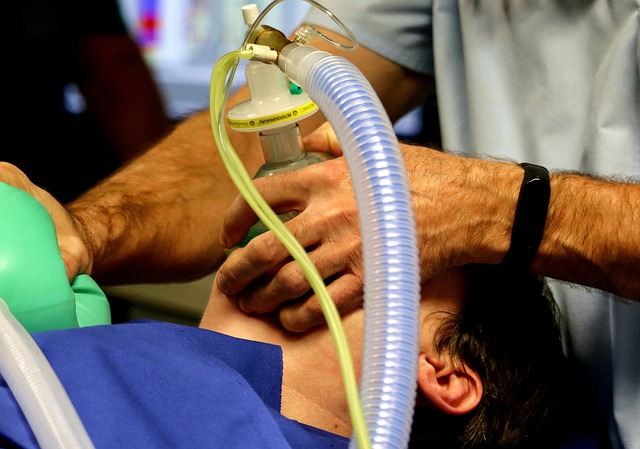Unmasking Wisdom Teeth Removal: Is Intubation Necessary?
Welcome to our informative article, where we shed light on the intriguing topic of wisdom teeth removal and the necessity of intubation during the procedure. For those who have recently embarked on this dental journey or are considering it in the future, understanding the various components and options available can provide invaluable insights. So, let’s dive into the world of wisdom teeth removal and explore whether intubation is truly necessary. Prepare to unmask some fascinating facts and gain a clearer understanding of this commonly performed procedure in a friendly and approachable manner.
1. Understanding Wisdom Teeth Removal: Debunking the Intubation Myth
When it comes to wisdom teeth removal, there are common myths and misconceptions that can cause unnecessary worry. One of the most prevalent myths is that intubation is a standard procedure during the removal process. Fortunately, this is not true for the majority of wisdom tooth extractions.
Intubation, which involves the insertion of a breathing tube into the windpipe, is typically only performed under specific circumstances, such as complex surgical cases or when the patient is unable to breathe on their own. For routine wisdom teeth extractions, intubation is unnecessary and not a standard part of the procedure. Your oral surgeon will carefully evaluate your case to determine the most appropriate and safe method of anesthesia and sedation, which may involve mild sedation or local anesthesia.
So, if you are worried about intubation during your wisdom teeth removal, rest assured that it is not a common occurrence. Your oral surgeon will thoroughly discuss the anesthesia options with you beforehand, ensuring your comfort and peace of mind throughout the procedure.

2. The Real Story Behind Wisdom Teeth Extraction and Intubation
Wisdom teeth extraction is a common dental procedure that involves removing the third molars, also known as wisdom teeth. These teeth typically erupt during the late teenage years or early twenties, often causing overcrowding or misalignment in the mouth. While the extraction itself is relatively straightforward, there are certain instances where intubation may be required.
Why is intubation necessary?
- Intubation is a procedure where a tube is inserted into the patient’s airway to help them breathe during surgery. It is often used when the patient is undergoing general anesthesia or if the procedure is expected to take a longer duration.
- For complex wisdom teeth extractions, especially those involving impacted teeth or when the patient has a strong gag reflex, intubation ensures their safety and comfort. It allows the oral surgeon to work efficiently and effectively, while ensuring the patient’s airway remains open throughout the procedure.
- During the surgery, the anesthesiologist will carefully monitor the patient’s vital signs, such as heart rate and oxygen levels, to ensure their well-being. Intubation helps facilitate this monitoring and also enables the delivery of any necessary anesthesia or controlled breathing.
It is important to note that intubation is only performed when absolutely necessary, and the decision is always made in the best interest of the patient’s health and safety. Dental professionals, including oral surgeons and anesthesiologists, work together to assess each case individually and determine the appropriate course of action for wisdom teeth extraction.

3. Is Intubation During Wisdom Teeth Removal Really Essential?
When it comes to wisdom teeth removal, one crucial question that often arises is whether intubation is truly necessary or not. While the decision ultimately depends on various factors, it is important to understand what intubation entails and its potential benefits.
What is intubation?
- Intubation is a procedure where a tube is inserted into the throat to maintain an open airway and provide oxygen and anesthesia.
- During wisdom teeth extraction, intubation is typically performed under general anesthesia.
Why is intubation necessary?
- For complex or lengthy surgeries, intubation ensures the patient’s safety by providing a secure airway throughout the procedure.
- It allows the anesthesiologist to carefully control the patient’s breathing and administer the appropriate amounts of medication.
- Intubation minimizes the risk of aspiration, which occurs when fluids or substances entering the mouth enter the lungs.
However, not all wisdom teeth extractions require intubation. Factors such as the complexity of the procedure, the patient’s age, medical history, and individual preferences should be taken into account by your oral surgeon to determine the necessity of intubation during your wisdom teeth removal. Always consult with your dentist or oral surgeon to make an informed decision based on your specific circumstances.

4. Exploring the Pros and Cons of Intubation in Wisdom Teeth Extraction
When it comes to wisdom teeth extraction, one consideration that often arises is whether or not to opt for intubation during the procedure. Intubation involves placing a tube into the patient’s airway to ensure a clear passage for breathing. While there are pros and cons to this approach, ultimately, the decision should be made in consultation with your oral surgeon or dentist. Here, we’ll take a closer look at the advantages and disadvantages of intubation in wisdom teeth extraction.
Pros of Intubation:
- Improved airway access, allowing the dentist or surgeon to have a clear view and easier manipulation of the operating area.
- Enhanced safety by preventing potential complications related to breathing difficulties or airway obstruction during the procedure.
- Ensures a higher level of oxygen saturation in the patient, especially if general anesthesia is used, promoting overall well-being and reducing the risk of complications.
Cons of Intubation:
- Increased risk of potential side effects such as sore throat, hoarseness, or injury to teeth, lips, or gums due to the presence of the tube.
- Extended recovery time for patients due to possible discomfort or pain associated with the intubation process.
- Higher costs associated with the use of an anesthesiologist and specialized equipment.

5. Unmasking the Truth: Unraveling the Need for Intubation in Wisdom Teeth Removal
When it comes to wisdom teeth removal, there has always been a debate surrounding the need for intubation. Intubation is the process of inserting a tube into the airway to assist with breathing during surgery. However, recent studies have shed light on the fact that intubation may not always be necessary for this specific procedure.
So, why is intubation often used during wisdom teeth removal in the first place? Mainly, it is used as a precautionary measure to ensure patient safety and maintain an open airway during the surgery. However, intubation carries its own set of risks and complications, including sore throat, damage to the vocal cords, and even the potential for aspiration. This has led dental professionals to question whether intubation is truly necessary in all cases.
- Benefits of avoiding intubation: By avoiding intubation, patients can experience a number of benefits, including reduced risk of complications, minimized discomfort, and shorter recovery time. Additionally, without intubation, patients do not have to face the typical side effects associated with this procedure.
- Alternative techniques: One alternative to intubation is the use of a laryngeal mask airway (LMA). This device is less invasive and can provide a secure airway during surgery. Another option is a nasal airway, which allows for ventilation without the need for intubation.
While every patient is unique and may require individualized care, it is crucial for dental professionals to stay informed about the latest research and consider the benefits of avoiding intubation in wisdom teeth removal. By exploring alternative techniques and evaluating the risks and benefits for each patient, we can ensure a safe and comfortable experience for all.
6. Do You Really Need to be Intubated for Wisdom Teeth Extraction? Let’s Talk Facts!
When it comes to wisdom teeth extraction, one common concern is whether or not you really need to be intubated during the procedure. Let’s dive into the facts to give you a clearer understanding of what’s involved!
Intubation, the process of inserting a breathing tube into the throat, is typically not required for most wisdom teeth extractions. This procedure is usually reserved for more complex cases or patients with medical conditions that necessitate it. Here are some key points to consider:
- If your wisdom teeth are fully erupted and easily accessible, intubation is unlikely to be necessary.
- Most wisdom teeth extractions can be performed using local anesthesia or a combination of local anesthesia and sedation.
Why is intubation not always needed?
- Wisdom teeth extraction is a relatively short procedure that usually lasts under an hour.
- The likelihood of complications necessitating intubation during a routine extraction is low.
Remember, the need for intubation will ultimately be determined by your oral surgeon based on your specific case. They will consider factors such as the position of your wisdom teeth, the complexity of the extraction, and your overall health. It’s always best to have a thorough consultation with your oral surgeon to discuss your concerns and understand the recommendations specific to your situation.

7. Unleashing the Secrets of Wisdom Teeth Surgery: Intubation or Not?
Wisdom teeth surgery can be a daunting experience for many. One of the key decisions that oral surgeons have to make during this procedure is whether or not to perform intubation. Intubation, which involves inserting a tube into the patient’s airway, is commonly used in surgeries to ensure proper breathing. However, in the case of wisdom teeth removal, the need for intubation is a topic of debate among dental professionals. Here, we will explore the pros and cons of intubation during wisdom teeth surgery, helping you make an informed decision.
Pros of Intubation:
- Anesthesia Control: Intubation allows the anesthesiologist to have greater control over the patient’s airway, ensuring a steady flow of oxygen and reducing the risk of complications.
- Emergency Preparedness: With a tube already in place, it becomes easier to manage any unforeseen complications that may arise during the procedure.
- Improved Surgical Access: Intubation can provide better access and visibility to the oral surgeon, allowing for a smoother extraction process.
Cons of Intubation:
- Possible Side Effects: Intubation carries a small risk of complications, including damage to the teeth, lips, or airway. It may also cause temporary sore throat or hoarseness.
- Prolonged Recovery: Patients who undergo intubation generally experience a longer recovery period due to the added strain on the throat and airway.
- Case-by-Case Decision: Each patient’s situation is unique, and factors like existing medical conditions and the complexity of the procedure should be considered when deciding on intubation.
Ultimately, the decision of whether or not to perform intubation during wisdom teeth surgery should be made in consultation with your oral surgeon. They will assess your individual case and discuss the potential risks and benefits, guiding you towards the most appropriate choice for a safe and successful procedure.
8. Wisdom Teeth Extraction without Intubation: A Safe and Viable Alternative?
Wisdom teeth extraction is a common dental procedure that many people undergo to alleviate pain and prevent future complications. Traditionally, this procedure has been performed under general anesthesia, which often requires intubation. However, recent advancements in dental techniques have introduced a safe and viable alternative – wisdom teeth extraction without intubation.
This alternative method involves the use of local anesthesia, allowing patients to remain conscious but free from pain during the procedure. Here are a few key benefits of wisdom teeth extraction without intubation:
- No general anesthesia: By avoiding general anesthesia, the risks associated with intubation and recovery from heavy sedation are greatly reduced. This means a quicker recovery time and a reduced chance of side effects.
- Increased patient comfort: Being awake during the procedure can give patients a sense of control and peace of mind. Additionally, local anesthesia ensures that only the treatment area is numbed, minimizing discomfort while allowing patients to communicate with their dentist if needed.
- Cost-effective: Wisdom teeth extraction without intubation is generally less expensive than procedures performed under general anesthesia. This makes it a more affordable option for patients who may not have dental insurance or have limited coverage.
If you’re considering wisdom teeth extraction, it’s essential to discuss the options with your dentist or oral surgeon. They will assess your specific case and guide you in determining whether the procedure without intubation is suitable for you. Remember, prioritizing your comfort and safety is crucial throughout any dental treatment.
9. Demystifying the Procedure: Evaluating the Role of Intubation in Wisdom Teeth Removal
Intubation is a procedure that may be used during wisdom teeth removal to ensure your safety and comfort. Despite its unfamiliarity, it plays a crucial role in the process. Let’s break down what intubation involves and why it is performed.
During wisdom teeth removal, intubation is the insertion of a plastic tube into your windpipe to help you breathe. This is necessary when a patient is undergoing deep sedation or general anesthesia. By providing a clear airway, intubation ensures that oxygen reaches your lungs smoothly, maintaining your vital functions throughout the procedure.
- Why is intubation necessary?
Intubation is necessary when deeper forms of anesthesia are used, as they can temporarily affect your ability to breathe on your own. By allowing the anesthesiologist to control oxygen delivery and provide mechanical ventilation if needed, intubation minimizes any potential risks or complications during the surgery.
- How is intubation performed?
Intubation is typically carried out by a highly trained anesthesiologist or oral surgeon. Before the procedure, you will receive medication to help you relax. The intubation process involves inserting a flexible tube through your mouth or nose and down into your windpipe. Once correctly placed, the tube will be connected to a ventilator that delivers oxygen and closely monitors your breathing pattern.
10. Weighing the Options: Making an Informed Decision about Intubation for Wisdom Teeth Removal
When it comes to removing wisdom teeth, one important decision to make is whether to undergo intubation or not. Intubation involves the use of a breathing tube during the procedure, ensuring a clear airway for the patient. Here, we will discuss the pros and cons of intubation, allowing you to make an informed decision that suits your needs.
Pros of Intubation:
- Anesthesia control: Intubation allows the anesthesiologist to have precise control over your breathing, making it safer for you during the surgery.
- Reduced risk of aspiration: By using a breathing tube, the risk of food or liquid entering your airway and causing complications during the procedure is minimized.
- Surgical access: Intubation provides a better surgical field by keeping the mouth fully open, giving the surgeon a clear view of the area or facilitating any necessary jaw manipulation required.
Cons of Intubation:
- Possible discomfort: Some patients may experience irritation or a sore throat post-surgery due to the intubation tube, but this is typically temporary and can be managed with over-the-counter pain relief.
- Rare complications: While extremely rare, there is a slight risk of complications associated with intubation, such as damage to the vocal cords or teeth. However, these occurrences are uncommon and usually preventable with proper care and expertise.
Frequently Asked Questions
Q: What are wisdom teeth and why do they need to be removed?
A: Wisdom teeth are the third set of molars that typically erupt between the ages of 17 and 25. In many cases, the jaw isn’t large enough to accommodate these new teeth, leading to various oral health problems such as crowding, impaction, infection, or damage to adjacent teeth. Therefore, removal becomes necessary to prevent complications and maintain overall oral health.
Q: Is intubation always necessary during wisdom teeth removal?
A: Intubation, or the insertion of a breathing tube, is not always necessary during wisdom teeth removal. While it is a common practice in certain situations, such as when undergoing general anesthesia or when complex surgical techniques are anticipated, it may not be required for all patients.
Q: Are there alternative methods of sedation besides intubation?
A: Absolutely! Several alternative forms of sedation can be used during wisdom teeth removal. Nitrous oxide (laughing gas), conscious sedation, or local anesthesia are often employed to ensure patient comfort and relaxation. These options can be discussed with your oral surgeon based on your individual needs and preferences.
Q: What are the potential risks associated with intubation?
A: Intubation is generally considered safe, but like any medical procedure, it does carry some risks. Potential complications might include throat irritation, damage to teeth or dental work, soreness, or a temporary change in voice. However, it is essential to consult with your oral surgeon or anesthesiologist, as they can provide detailed information specific to your case.
Q: Can I opt-out of intubation during wisdom teeth removal?
A: Yes, you certainly can. If your oral surgeon determines that your procedure does not require intubation, they will explore other sedation options to ensure your comfort and safety. It’s vital to openly discuss your concerns and preferences with your surgeon during the consultation to make an informed decision together.
Q: How long does it take to recover from wisdom teeth removal without intubation?
A: Recovery time after wisdom teeth removal can vary from person to person, regardless of whether intubation was used or not. Typically, it takes about 1-2 weeks to fully recover, but most individuals can resume their regular activities within a few days after the procedure.
Q: What are the factors that determine whether intubation is necessary or not?
A: Several factors, such as the complexity of the wisdom teeth extraction, the type of anesthesia required, the patient’s health history, and the surgeon’s preference and expertise, can influence the decision to use intubation. These factors should be discussed with your oral surgeon, who will determine the most suitable approach for your case.
Q: Is intubation associated with a higher level of pain or discomfort?
A: No, intubation is not directly linked to increased pain or discomfort after wisdom teeth removal. The discomfort experienced during recovery is primarily due to the surgical procedure itself, and any post-operative pain can be efficiently managed with prescribed medications and proper post-operative care.
Q: How can I ensure a smooth wisdom teeth removal procedure, whether intubation is used or not?
A: It is crucial to follow the pre-operative instructions provided by your oral surgeon, such as fasting requirements and medication guidelines. Additionally, maintaining good oral hygiene and adhering to the post-operative care instructions will greatly contribute to a smooth recovery. Lastly, clear communication with your surgeon, addressing any concerns or questions you may have, is essential for a successful experience.
Conclusion
In conclusion, dear readers, we hope that this article has shed some light on the topic of wisdom teeth removal and the debated necessity of intubation during the procedure. While there are valid reasons for employing intubation in certain cases, it is crucial to approach each situation individually and prioritize patient safety and comfort.
Remember, wisdom teeth extraction is a common dental procedure that aims to prevent potential complications and maintain oral health. By discussing your concerns and cooperating closely with your dentist or oral surgeon, you can ensure that the most suitable approach to anesthesia and intubation is chosen for your specific needs.
Always stay well-informed, ask questions, and share any relevant medical history or conditions with your dental professional. Their expertise and knowledge will guide you in making the best decision for a safe and successful wisdom teeth removal.
If you are still unsure whether intubation is necessary for your procedure, don’t hesitate to seek a second opinion or consult another oral healthcare provider. Together, you can evaluate all the aspects and make a well-informed decision that truly encompasses your best interests.
We hope that this article has offered valuable insights and answered some of your questions about the necessity of intubation during wisdom teeth removal. Remember to remain calm and trust in the expertise of your dental team, who will guide you through the process with the utmost care and consideration for your well-being.
Thank you for reading, and remember to prioritize your oral health for a happy and healthy smile!






